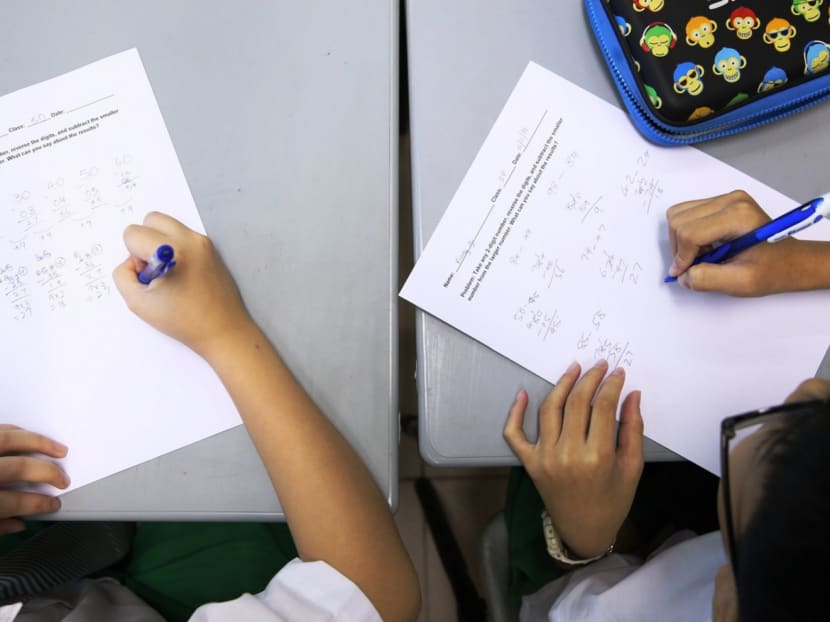When giving students feedback beats giving them homework
Mrs Brandy Young, an elementary school teacher from Texas, announced last year that her class would no longer receive homework. “Eat dinner as a family, read together, play outside and get your child to bed early,” she wrote in her note to parents.

A UK think-tank found that giving pupils homework can add an extra month’s progress over a year. By contrast, giving pupils feedback can add five months’ progress over the same period. TODAY FILE PHOTO
Mrs Brandy Young, an elementary school teacher from Texas, announced last year that her class would no longer receive homework. “Eat dinner as a family, read together, play outside and get your child to bed early,” she wrote in her note to parents.
An approving parent posted Mrs Young’s message on Facebook, and it went viral. The letter won plaudits and prompted a public debate about whether homework and other school strategies such as making class sizes smaller and enforcing uniforms really lead to better academic results.
One London primary school, for example, was reported to have insisted that pupils walked with their hands clasped behind their backs in order to “raise aspirations” (the so-called “university walk”, condemned as dictatorial by parents, was later dropped).
The stream of bright ideas can be dizzying, and the dividends are hard to pin down. The Sutton Trust, a United Kingdom think-tank, has long recognised this.
I first came across its pioneering research about six years ago when I was a school governor in London.
Being an evidence junkie, I was struck by the trust’s finding that many supposedly advantageous practices, such as school uniforms and smaller class sizes, made little difference to academic outcomes.
In 2011, the trust set up the Education Endowment Foundation (EEF), a charity funded with £125 million (S$222.9 million) from the UK government. It runs randomised controlled trials to uncover which schemes actually work.
In fact, says Mr James Turner, the EEF’s deputy chief executive, it is as much about pinpointing what does not work. On this, Mrs Young had it about right: Homework does not always make the grade.
Mr Turner explains: “Homework can add an extra month’s progress over a year but given the time and effort involved (in setting and marking), is it really the best use of teachers’ time?”
By contrast, giving pupils feedback can add five months’ progress over the same period.
Homework’s continued existence owes much to parental expectation. It does, though, help secondary school pupils to do better, perhaps because it teaches them how to learn independently.
As for secondary schools, they should rethink the “dosage” mantra: That if a child struggles with maths, say, she should do more of it.
Mr Turner asks: “If the teaching isn’t working, then why deliver more of the same?”
That is why, on every measure, high-quality teaching really matters: The best teachers get the best results.
Brilliant educators will wow a class of 30 as easily as a class of 25 or even 20. Studies consistently show that, of itself, smaller class sizes make no difference (classes have to shrink to about 15 or below before a benefit appears).
Streaming is a dubious practice: Any benefits for top students are always outweighed by the disadvantages for those who are struggling. On the other hand, giving pupils continual feedback produces dramatic improvements.
Focusing on what happens during lessons does not mean that learning should start and stop at the school gates. The pay-offs of initiatives pale next to parental influence.
“Parental engagement can without doubt compensate for poor schooling,” Mr Turner says. “Good schools matter more to those who don’t get the support at home.”
That support should include reading to young children, and, when they are old enough, your children reading to you. Widening the vocabulary helps, too. Parental engagement can tail off in the teen years, as pupils become more independent — and increasingly welded to smartphones.
The EEF is conducting a fascinating trial to shoehorn secondary school parents back into the engagement loop. Selected secondary schools are sending regular text messages to parents, such as prompts about homework.
The SMS updates give parents an opportunity that may not otherwise arise to discuss school with their child. Those discussions can be tricky when children are revising for end-of-year exams. It is dangerously easy to find yourself nagging your teenager to get off their phone, and into work mode.
In fact, Professor Steve Higgins, professor of education at Durham University, says, haranguing can make things worse by making a child feel isolated or rebellious.
So, here are his top revision tips: There is no magic bullet except hard work. It is how you do the work that makes the difference. Revise in blocks of content, and keep returning to the blocks to test yourself honestly.
Highlighting text and writing summaries is not that effective. Instead, practise the test format. If essays are on the horizon, practise writing to develop handwriting stamina, and on the big day, try to get into the just-right “Goldilocks” — focused enough but not too keyed up.
It is time to text my teenager. FINANCIAL TIMES
ABOUT THE AUTHOR:
Anjana Ahuja is a contributing writer on science for the Financial Times.






